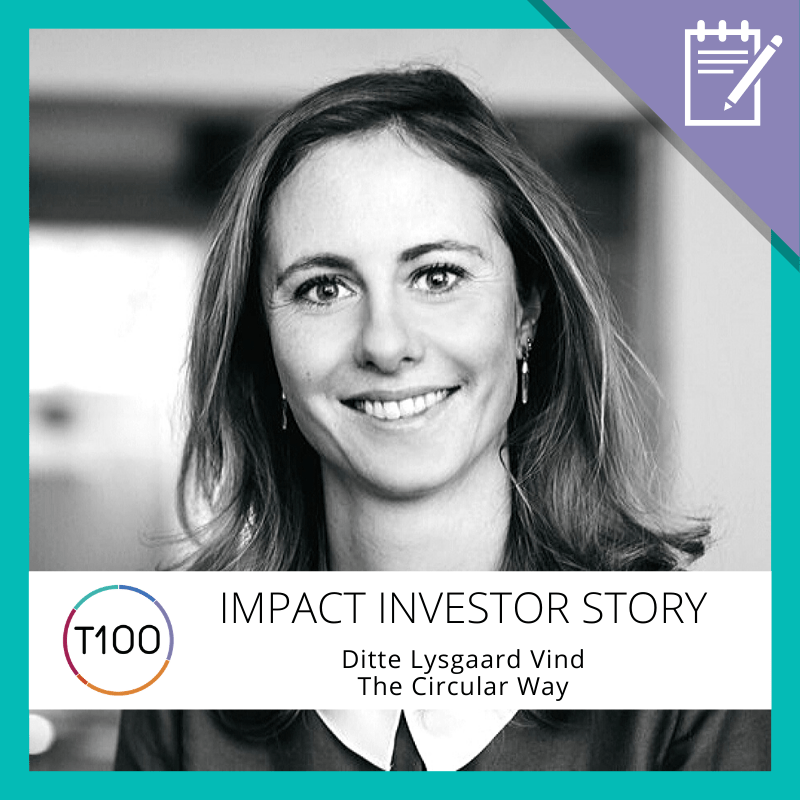Ditte Lysgaard Vind, CEO & Advisor, The Circular Way
Ditte Lysagaard Vind is no stranger to traveling, and not because her grandparents owned a shipping company. The adventurous 30-year-old travelled from her native Denmark to study abroad, and, when she wanted to learn more about catalytic philanthropy and impact investing, she packed her suitcase again to go to the U.S. She joined the Impact Investing for the Next Generation Program jointly offered by the Initiative for Responsible Investing at Harvard Kennedy School and the Center for Sustainable Finance and Private Wealth (CSP) at the University of Zurich. The CSP is a founding member of C4i, the Coalition for Impact. Ditte wanted to hear first-hand from impact professionals to figure out how to have the most leverage with the money she and her family inherited.
She studied business in Copenhagen, and then sustainability leadership at Cambridge (UK). “I have always been drawn to sustainability and had an activist role in the environment when I was a student,” she confides. She was also familiar with portfolio management after a first professional experience. So, she decided to create a new entity (The Circular Way Invest) separate from the family holding, with the money she received, and she would invest according to sustainability principles.
Specifically, she chose to focus on the circular economy, aligning the investment company with her circular economy thought leadership consultancy, The Circular Way. Her first investment, in 2014, was in baby clothing. The business was based on the assumption that baby clothing, which is seldom used more than a few months, could be used again by somebody else. For this, the start-up she invested in had set up a specific product-as-a-service business model: for a monthly fee, a household with a baby would be regularly provided with suitable baby clothes. Clothes, therefore, needed to be well made to last more than a few months and be circulated. As Lysagaard Vind is deeply concerned with climate change, her second iconic deal (she made a few in between), in 2016, was in the first round in a circular economy focused private equity fund and now she is looking to finalize a deal in housing made from recycled material. “There are a lot of old houses, in particular in the countryside in Denmark, that are abandoned due to urbanization and in need of demolition,” she explains.
“If we move the materials from these houses with the people, and use part of the material from the old houses to build the new ones in the city, it will enable better living conditions, local jobs creation and Co2 emissions reduction – cost neutral,” she adds.
Though she already has a few direct investments under her belt, the young woman is aware of the fact that she still needs to learn and do more. And she is adamant:
“The impact I want to have is not to do ‘less bad’, but actually to do good. It seems odd to have the opportunity, see what is going on in the world and not do anything.”
So far, the portfolio is 35% invested in impact (in particular in impact funds). It took her a year to achieve this. She worked with her family, an advisor and a few portfolio managers. “After our advisor prepared the portfolio managers on the fact that I wanted to talk about impact investing in the next meeting, one portfolio manager admitted he had to google the definition of impact investing!” she
remembers. “And it didn’t get any better, as he went on to simply tell us we could rest assured we didn’t hold stocks from tobacco companies!” she laughs. This portfolio manager no longer works for her family.
Before she found the right advisor, she had to do a lot of evangelizing. “Some really pushed back,” she recalls.
At best, the firms the family consulted advised to put returns to philanthropic use. No wonder a change was in order for her and her family. Fortunately, her family is taking a long view on their capital investments. And all are interested in mixing financial returns with impact. “But I am the one with the highest level of urgency to get into impact”, she underlines.
Raul Pomares, the founder of Sonen Capital, a firm specialized in impact investing in San Francisco, whom Lysagaard Vind saw during her cross-country travels in the U.S., was of great help, too. “One of our previous portfolio managers had googled impact investing, so I did too, to find out about the community in New York and California,” Lysagaard Vind smiles. Afterwards, Pomares came to Denmark to give her a hand. “I didn’t know enough at that point,” she says, with her blue eyes twinkling. Now that she is more experienced, she is also more optimistic.
“There is a lot of interest among the new generation,”
she points out, citing colleges that offer courses in impact investing, as well as young activists happy to dive into circular economy to change the system from within, and conventional investors who are gradually warming to impact. But she will not rest “before everything is changed,” she swears. She is happy to be part of a new community of game changers through Toniic.
Being strong and determined seems natural to her. After her grandfather died, her grandmother led the shipping company for many years. The shipping company was born from cheap gasoline, that her grandfather started selling in the 50’s in Denmark. Soon, larger suppliers tried to bar him from getting
the fuel sold at prices that were too competitive for their liking. “So my grandfather decided to borrow money to buy a ship and get his own supply,” Lysagaard Vind explains. The family gradually turned the gasoline business into a shipping business. “True, we were given a lot of opportunities when we were children, but we were held to high standards of responsibility, and taught to be the best version of ourselves,” she recalls. Now, like her grandfather, Lysagaard Vind wants to take her own company to another level. She would love to invest in the circular economy in emerging countries. She also wants more scale and as many good business cases as possible in terms of market returns to make a bigger difference. She is confident that she will achieve it, with co-investing, for example.
Forever a businesswoman, she has also developed a consultancy on the side, advising businesses on the circular economy. “We now have five people in the consulting firm and there is a growing demand for circular economy activities,” proudly notes The Circular Way CEO. The two businesses are actually cross-fertilizing. She transfers knowledge, and some information is fed back to her own company. In short, her own version of the circular economy.

